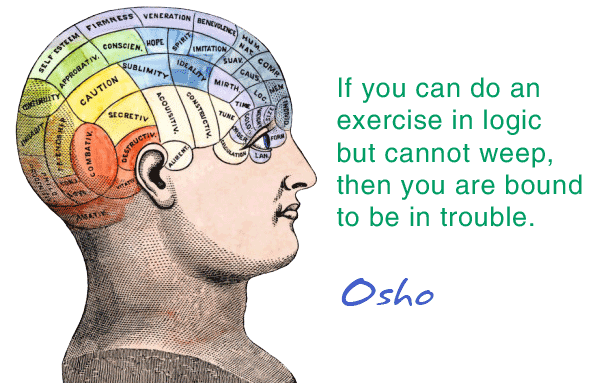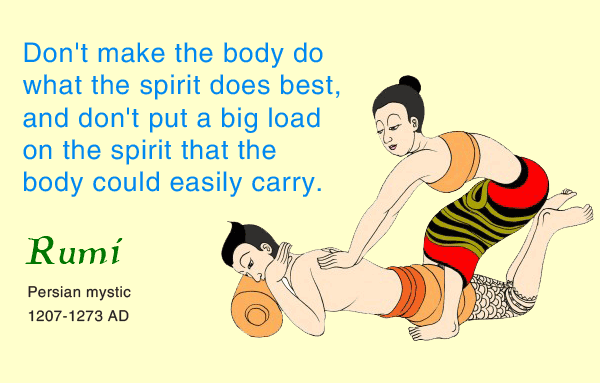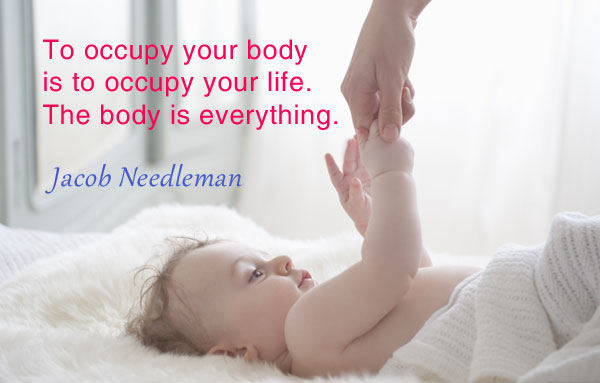Contact me
Tel. 07502 136692
Email: richard@bodymind-integration.co.uk
Richard Lawton
Bodymind Integration
2A St Georges Rd.
Mitcham CR4 1EB
© Richard Lawton 2001-2020
Eric Berne, the creator of Transactional Analysis, wrote "People are born princes and princesses, until their parents turn them into frogs." I created this video to provide a simplified explanation of how this happens.
The traditional view in Western philosophy is that mind and body are completely different and separate. This idea (known as mind-body dualism) sees the mind as occupying and controlling the body, much like a driver in a car. Humanistic psychology uses the term 'bodymind' to refer to a unified system in which mind, body, and spirit are dynamically interrelated and changes in one area propagate throughout the whole system.
Although many of us identify ourselves with the thinking part, the mind, we know that it is not truly separate from the body. When stressed we get tension in our head, shoulders, neck and back, so it is obvious that the mind affects the body. When we are ill or in pain, as well as feeling the discomfort we tend to feel miserable too - clearly the body affects the mind. We're all familiar with this, it's pretty obvious. So why when it comes to our well-being, do we forget this mind-body connection? Psychotherapists ignore the body. Doctors ignore the mind. It seems a stupid way to go about things. Bodymind therapy works with both mind and body as a whole system. It understands that the body holds our emotional history just as much as the mind does, and that psychological and behavioural patterns established in childhood have physical counterparts.
Children are naturally energetic, expressive and self-centred, and their parents teach them 'how to behave'. Those parents often have problems and stresses of their own, which can lead to poor parenting of the child. Sometimes this is malicious in nature, but for most people it is simply flawed and inadequate. Take, for example, a child who is persistently and harshly told to "stop fidgeting!" The child learns that natural free movement is unacceptable behaviour, and will carry that belief - that rule - into adulthood. But to obey the rule, the child has to physically prevent his or her body from moving, by tensing arms, legs, hips, etc. This tension becomes chronic, locked in, forming a habitual tense posture which eventually they don't even notice - it becomes normal.
These postural tensions (called 'body armour') influence not only how we walk, talk, move and breathe, but also how we think and feel. The body becomes 'programmed' to respond in certain ways, affecting our whole character and outlook on life. Body armour may be sending out signals that lead other people to treat us in ways that are not consistent with who we think we are or what we think we are communicating. They may cause a rift between what we believe and how we actually feel and act. Our inner struggles to resolve conflicting tensions may result in persistent poor health or 'dis-ease.'
Of course children have to learn the rules of our society, understand what is appropriate and inappropriate behaviour and develop the ability to control their impulses. However, parents pass their own woundings onto the children in one way or another. As the poet Philip Larkin wrote:
They fuck you up, your mum and dad.
They may not mean to, but they do.
They fill you with the faults they had
And add some extra, just for you.
We absorb their wounded behaviour and unconsciously turn it into rules that we must obey. Rules like:
And so on and so on...
My aim is to help you understand and change the hidden rules & beliefs you are living by, and to release the body armour that contains them. To help you become free to live your life as you choose - not as according to childhood programming of your thoughts, feelings and behaviour.
I wish that one day our government would take the bold step of making it compulsory for schools to teach basic psychology (the study of the human mind and behaviour). Why? Because it appears that the general public has a poor grasp of the mechanics of how we humans function, and this creates all kinds of problems. Knowledge is power, and if you don't understand yourself you don't have the power to make the best of yourself. This lack of knowledge also means that the term 'mental health' often has negative connotations, leading people to think that there is something fundamentally 'wrong' with anyone who is experiencing emotional, behavioural or psychological difficulties. But the truth is that everyone experiences such struggles - it's part of being human. For some people the difficulties are minor and they work them through naturally with help from friends or family. Some put up with it, learn to cope and simply struggle on through life. Others choose to seek help from someone who has special skills, such as a psychotherapist.

For some people, the term psychotherapy can make things seem too serious, too heavy, too daunting. But it is simply a Greek word meaning 'soul healing'. So a therapist is simply someone who has special skills in healing the soul (mind, heart, spirit). It is really no different from other things in life; most of us can manage to replace a lightbulb or a blown fuse, but if the house needs re-wiring we call in an electrician - someone with a special set of skills.
Psychology is the study of how we humans are 'wired'. It may seem strange to think of it like this, but we are all wired in our own unique and individual way. Our childhood experiences, especially, create certain patterns of thinking, feeling and behaving. We develop a fundamental belief system about what it is to be human, how to relate, communicate and behave in a social world. We follow the 'rules' of this belief system in everything we do - usually without realising that we are following rules.
Therapy is for when you recognise that the way you function in the world is not working as well as you would wish and that perhaps you need a bit of re-wiring of "you". It is a process of dismantling the old setup of rules & beliefs and building a new and more effective one.
Body-centred therapy does not have a high public profile, although it is starting to become more well-known. It is strange that the general public are not so aware of it, as this approach actually pre-dates talk-based therapies such as counselling and psychotherapy. An integrated approach treating mind, body and spirit is a very ancient practice. It was certainly how doctors worked in ancient China - the Traditional Chinese Medicine (TCM) approach involved herbal medicine, acupuncture, massage, exercise, and dietary therapy. Anyone who thinks that dream analysis began with Freud and Jung might give a thought to the ancient Greeks: those who sought healing often visited the temple of Asclepius, where they stayed overnight and had to report their dreams to the priests as part of the diagnosis; as in TCM, exercise was often part of the cure. Mindfulness, now being embraced by the mainstream as a powerful therapeutic technique, was taught by the Buddha 2500 years ago.

There is, then, a long-history of body-centred therapy, dating back to the earliest human records. It was brought into the modern age of psychotherapy by Wilhelm Reich, a pupil of Freud, when he published the seminal 'Character Analysis' in 1933. It has also incorporated elements from movement re-education systems, such as the Alexander Technique (first developed in the 1890s), and the Trager Approach (dating back to the 1920s), and from practices from other cultures: mindfulness from Buddhism; movement and energy from Qi Gong & Tai Chi; breathwork from yoga; energy work from Ayurveda... Somatic therapies have drawn on the best of human wisdom across cultures and across millennia. It is really only in the last 60 years that talk-based therapies have come to dominate - and there are clear signs that this trend is now reversing, as people realise the limitations of talk and of pills, and connect with their desire to be treated as a whole person.
It is this very concept of the 'whole person' that is the foundation of my work. Whether it is emotional and psychological problems, health issues or spiritual concerns, my aim is to integrate the whole person, helping you be more in tune with your body, more at home in your skin, liberating your personal power and become more vibrantly alive and open to pleasure, joy and love.
I am a practitioner of somatic (body-centred) therapy. This is a truly holistic approach, as it treats people as a whole person and approaches their problems accordingly. Traditional talk-based therapies only engage the mind. For health problems, doctors only treat the body. Body-centred approaches work with mind, body and spirit.
When stressed we get tension in our head, shoulders, neck and back - we're all familiar with that. So the best help would be a therapy that works with both the emotional stress and the physical tension. Everyone knows that counselling helps with emotional problems and that massage helps with physical tension. What many don't realise is that they meet in the middle - and that's where I work.

I offer various forms of body psychotherapy (Bodymind Integration, Reichian therapy, Postural Integration) to help you find solutions and connect with your true self on a new and deeper level. My approach blends deep bodywork, talk-based therapy and other techniques to resolve the root cause of problems. If we choose to build a different relationship with our bodies we find that the body both grounds us in reality and is a touchstone for our true feelings: the body never plays mind games and is the safe refuge from confusion and overwhelm.
Bodymind integration is a truly holistic therapy, a whole-person alternative to counselling and psychotherapy. It can help with many problems: relationships (emotional and sexual intimacy); problems reaching orgasm or premature ejaculation; stress and anxiety; lack of confidence and low self-esteem; health issues; body image and diet; and many more. It is also a wonderful route of personal development, empowerment and creativity. Read more about the type of issues I work with.
If you want to learn more about somatic psychology and mind-body approaches, here are some useful links for further information.
If you're intrigued or excited by what you've read and would like to explore yourself in this way, please contact me.